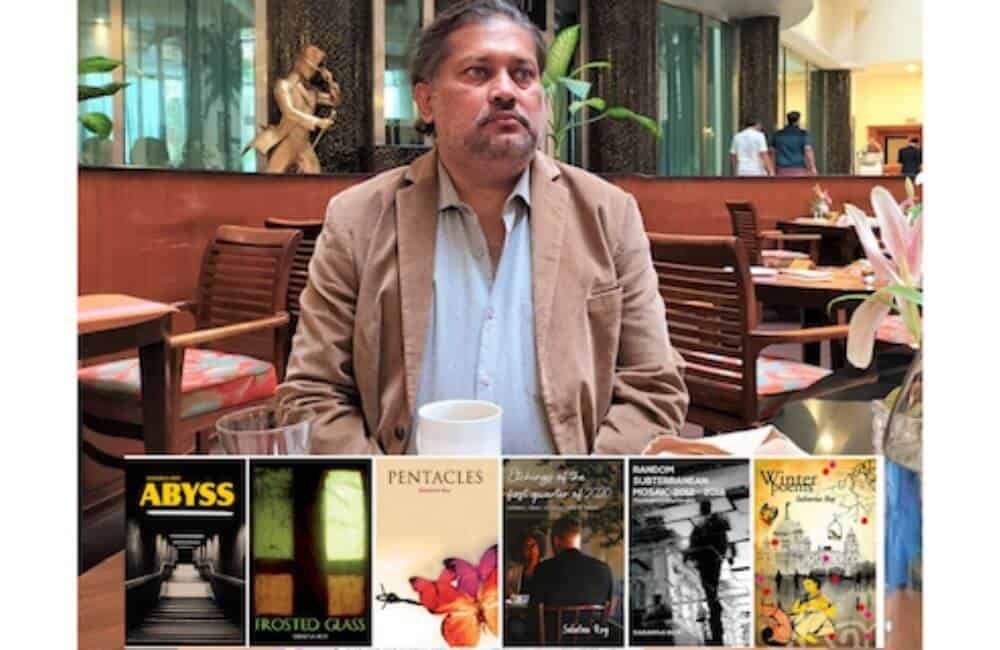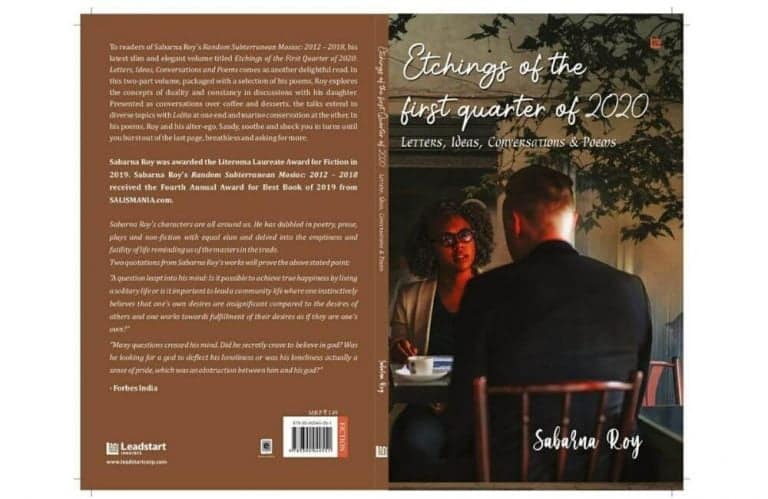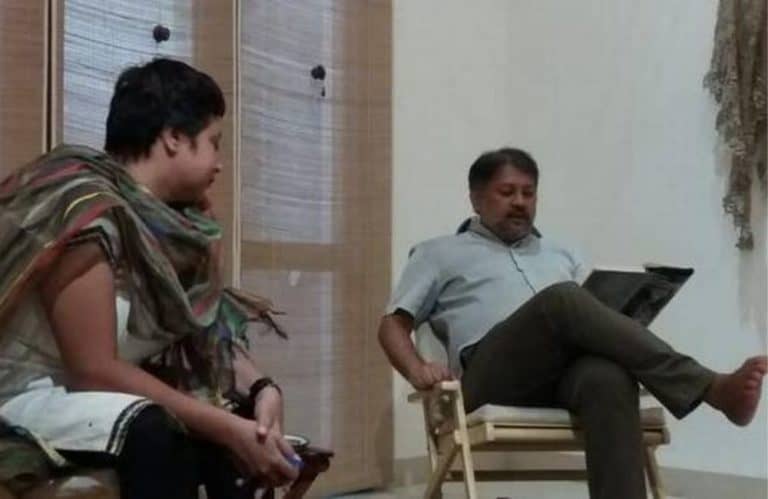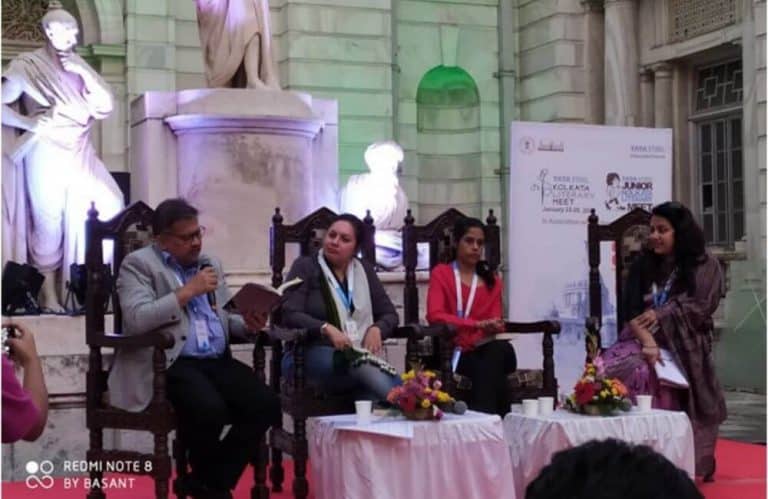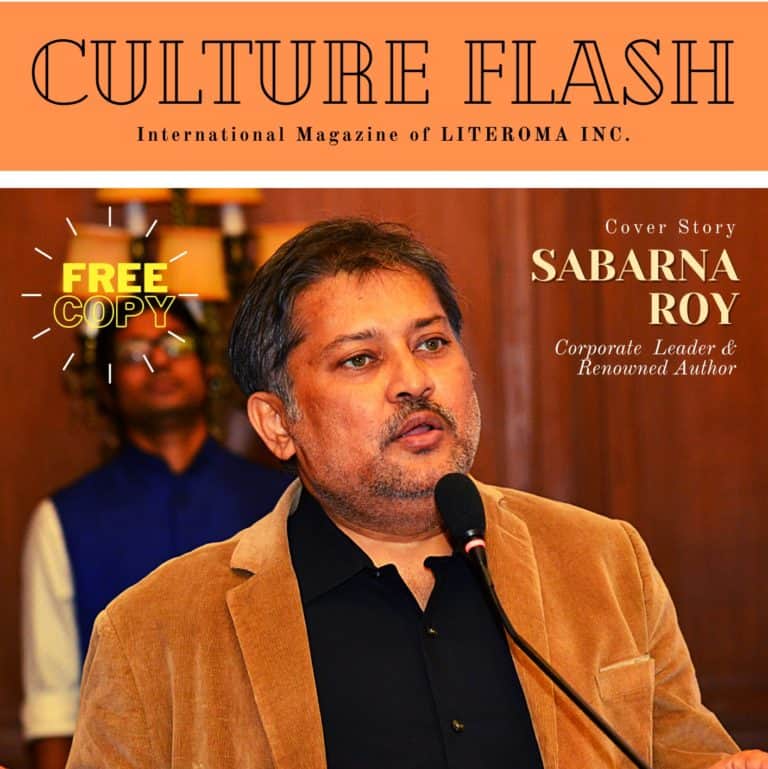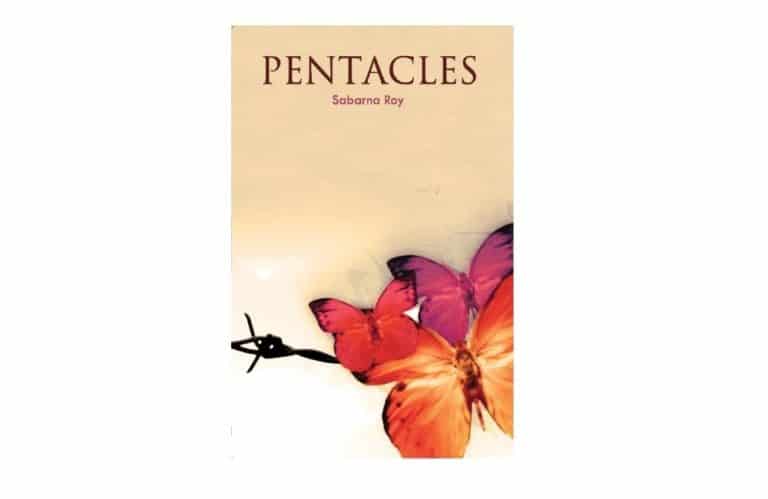Sabarna Roy: An Eclectic Storyteller
Sabarna Roy’s literary works are an eclectic mix of prose, narrative poetry, conversations, letters and opinion pieces. One must dive into the snippets of his works to be able to fully gather the steam to soak the vividity and poignancy of his literary works.
We present before our new readers’ excerpts from his works to be able to inculcate interest in his critically acclaimed bestselling works.
Sabarna makes us feel deeply in his novella, New Life in Pentacles:
“Sometimes I have wondered how someone’s body can be pledged to someone else because of love. Is it a manner of speaking or is it truly felt and meant? My assessment is: this is a fantastical claim uttered in a phase of fulfilment and disconnect with the present. This does not happen in love but in a shadow of love, which is so difficult (mostly impossible) to identify or separate from love. At the core of our heart, we think bodies are irreplaceable, whereas in real life, they are. Faces are not. Faces carry the roots of our identity but we do not say, “This face is yours,” because we know such a thing can never be and it sounds so funny to hear that. In love, our soul gets attached implicitly to the face we love but we think it is the body. Our obsession with a body is transient. Our soul is searching for a face. But our eyes are looking for a body. If we can see our fate in a face, we will chase it till death, not thinking about the consequences of such a chase. Otherwise we will lack adequate courage and even the wherewithal to continue this chase. It will be a rare occasion when two persons see each other’s fate in their faces. Has it happened ever? I do not know. Before we can look for signals in a face, we start receiving signals from our body. We call these clouds of desire as love.
In this context when I reviewed Rohini’s remarks of seeing her fate in my eyes and her proclamations pertaining to my rights over her body, I could not conclude anything.”
Later, in Pentacles in the ballad, The Tower, he writes:
“My wife belongs to lands where fables are written,
I snatched her from a fable and made her mine.
In doing so I made her the heroine of one fable,
And a vamp in another.
There are days when we go to the terrace of this tower,
Soaking sun in our burnt out bodies, standing taller
And looking breathlessly at the city,
Which feels like a crouching demon, inching towards us.
Will we feel like immigrants forever on this planet?
To douse our eternal fears we pray; we pray like devotees are required to pray.
We end all our prayers with one line:
Let this city keep some space for our children,
Whose faces resemble those fluffy angels in a dream!”
In Frosted Glass in the story, The Prank, Sabarna writes:
“Kakali answered, “Who knows, I might. Did you see my gown, Rahulda? How do I look? You don’t look at women at all!”
Rahul looked at her more directly now from top to bottom and said, “The cut and colour are marvellous. You look beautiful. You always look beautiful, irrespective of what you’re wearing. That’s what beauty is. Who said I don’t look at women? I do look at a few of them.”
“Then it’s high time you marry one.”
“Why, what’s in a marriage, Kakali?”
“Give me one good reason why you should remain a free bird when all of us on this island are suffering the levies of imprisonment.”
“Well, for one, a free bird is a positive change of perspective for so many prisoners, no?”
Kakali asserted, “No. Jokes apart, no. Think about yourself. There’s an imbalance in your life.”
“Do you think all balance is good?”
Kakali reacted – genuine concern ringing in her voice now, “You’re digressing Rahulda; you’re talking philosophy. I meant something else. You have nobody other than your servants to look after you. You’re involved in your job and career; some day you will feel terribly lonely, Rahulda. You will want to talk at length in the evening. You will want to hold somebody dear. That’s not philosophy. It’s a primitive instinct to be cared for. Family provides that in a basic and fundamental way. I’ve seen my elder brother steep into brain-shattering loneliness; he left the family at an early age to live in the forests as an environmentalist. Today he fits nowhere. How I wish the world could have absorbed into its folds people like my brother and you without batting an eyelid, but it doesn’t. A person refusing to rear a conventional family is considered a rebel. What they never care to look at is, such a thing could have happened by chance, circumstance, youthful chivalry, some kind of an engaging responsibility or a debilitating disease and not out of choice.””
In The Reunion, in Frosted Glass, he writes:
“Ever since Rahul read the news in the morning paper he had been vexed and anxious. His face clearly revealed
that he was in a dilemma. He took out the newspaper cutting and read it again:
A WOMAN KILLS HER DAUGHTER AND HUSBAND IN A FIT OF RAGE IN NORTH KOLKATA
A woman named Bimala Sen, from a lower middle-class quarter in the northern part of the city, was arrested late last night on charges of murdering her husband and daughter. The woman, in her mid-fifties, is reported to have lost her mental balance and was prone to aggressive and hostile behaviour with her family and neighbours. She has confessed to her crime during the preliminary interrogations in police custody. The daughter, in her early thirties, was found in a thick pool of blood, with multiple wounds inflicted by a sharp knife on her chest, abdomen and face. It is believed that the girl was in a compromising position with an accomplice of her father (an alleged pimp), when her parents barged into the room. According to eye-witnesses, the man fled the scene leaving the dazed girl and her father who was immediately attacked by Bimala Sen in a fit of rage. The murder weapon has been recovered from the scene of the crime. Bimala Sen has been remanded to police custody and the lawyer provided to her by the State is likely to apply for bail soon. The extent and motive of pre-meditation is likely to be a matter of deliberation among the investigating officers and lawyers in the days to come.
Rahul considered the newspaper report for a long time and wondered whether this was the same Bimala Sen he had known some twenty years ago.”
In Frosted Glass, there is a poem cycle, which contains a poem, titled: Araku and it reads as follows:
“I saw another night falling on the green mountains and valleys of our youth
A silent crucible of unknown trees, grasslands and tribes
Pouring a rhythm in my soul
For a second I thought: where was I, where would I go
When I saw you running through the diffusing beam of smoke breaking on
the southern mountains
Like a deer
The stars twinkled like never before
Showering your path with ancient light
The green mountains and valleys of our youth suddenly shone with another
light fired from within the tired earthly layers
You came so near panting and gasping looking into my eyes
I opened my arms
Was it real?
Was it a dream?
I knew it was happening in another world
Where you and I lived.”
Act 2, Scene 7 of Sabarna’s crime thriller, Abyss seems spine-chilling:
“Debasree: What’s your assessment of Renuka?
Mriganka: Sharp, nosey and seems to know her job quite well.
Debasree: Do you find her attractive enough?
Mriganka: Not really, she is black in complexion; I don’t like black women. I told you once. [Pause] What’s your assessment of her?
Debasree: I think she’s brilliant.
Mriganka: She’s talking funny things about you.
Debasree: Like what?
Mriganka: Like you’re disintegrating.
Debasree: What?
Mriganka: She says – you’re burning your stock investments; you’re selling off acres of tribal land that you had procured in Jharkhand through shady deals in Oindrila’s name for your dream project of a steel mill; you’re gradually crawling out of illegal mining operations.
Debasree: It could be true.
Mriganka: Is it true?
Debasree: Does anything matter when Oindrila is no longer with us?
Mriganka: I really don’t know what to answer to that. Here’s a woman who’s trying to show people you’re disintegrating. You’ll still pander to her line of thinking?
Debasree: It doesn’t matter.
Mriganka: Are you disintegrating?
Debasree: What do you believe is going on with me?
Mriganka: You’re in a state of shock. But I don’t believe you could lose your sense of control permanently. You can do so by resisting your inner demons – at least make an effort.
Debasree: It doesn’t matter to me what you or Renuka or for that matter anybody thinks about me.
Mriganka: Are you going to destroy your empire and kill yourself?
Debasree: What if I do?
Mriganka: How can you do that? I suspect you’re beaming an image.
Debasree: An image of what?
Mriganka: An image of shock that amplifies your true shock.
Debasree: What kind of a swine are you! Are you afraid your book won’t get published if I were to
kill myself?
Mriganka: I’m not afraid of anything. Don’t you bitch with me!
Debasree: How dare you talk to me like that!
Mriganka: How dare you talk to me like that!
Debasree: What’s the point you’re trying to make?
Mriganka: You’re maniacal about everything! You need to conquer each and every piece of shit on this earth! It gives you a bloody kick to manipulate each and every strain of an operation! You just need to be at the centre. Just see the outcome of introducing Renuka in the investigation. You had motives of your own. You think you can control everyone and everything. Whereas Renuka goes about and unearths your life and others’ lives as if all of us were cutlets getting oil fried in a suffocating pan. She’ll destroy you. Mark my words!
Debasree: I’ll deal with her. And, if I get destroyed, I get destroyed; what’s that to you?
Mriganka: You know my feelings for you!
Debasree: You parasite! You know my feelings for you; did you care?
Mriganka: What do you mean?
Debasree: Ask yourself!
Mriganka: I’ve asked myself; I get no answer; now you tell me.
Debasree: You know what – I should’ve shot you long back, the day Oindrila died, maybe earlier, the day I saw you first. You’re evil!
Mriganka: And, you’re what? A nun who kills for fun?
Debasree: I don’t bother. But ponder for a moment; just imagine a nun who kills for fun should be a very complex and interesting woman.
Mriganka: You are; there’s no doubt about that. [Pause] I find in you a decisive change.
Debasree: What kind of a change?
Mriganka: Like you’re locked between the memories of your past and your imagined future.
Debasree: Actually I’m caught up with the present. I’m at a strange crossroad. I never thought I could ever reach such a situation in my life.
Mriganka: Meaning, which you can’t easily control.
Debasree: Suppose if I stop controlling, where would I reach?
Mriganka: Of course inside a jail for all the crimes you’ve committed against humanity! On a serious note – are you planning to become a nun inside a jail?
Debasree: Who’s more evil – you or me?
Mriganka: I’m not evil. I’m the chronicler of evil; I’m the user of evil; I’m the admirer of evil; I’m the lover of evil.
Debasree: Mriganka, you know what?
Mriganka: What my darling?
Debasree: I’m pregnant.
Mriganka: Pregnant! What the hell do you mean? You told me you hate condoms; you always promised to gulp those emergency pills.
Debasree: I forgot last time.
Mriganka: To blow-up a land-mine beneath my ass; fuck you! You can get it washed wherever, in any city of the world you feel like.
Debasree: I fear it’s Oindrila who’s inside me. I can’t kill her. If I let her live will she let me live?”
In Random Subterranean Mosaic: 2012 – 2018, which is essentially a kaleidoscope of various kinds of writings, talks to us about Chilka in Odisha:
“In 1998 during autumn, a group of my colleagues and I detoured from Bhubaneshwar to Chilka to taste golden fried prawns on the verandah of the OTDC Tourist Lodge overlooking the lagoon.
Chilka Lake, nestled in the heart of coastal Odisha, is Asia’s largest brackish water lagoon with water spread ranging from 1165 sq km in the rainy season to 906 sq km in the dry season and is nestled in the heart of the coastal Odisha. It extends from Bhusandpur in Puri district in the North to Rambha-Malud in Ganjam district in the South, separated from the Bay of Bengal by a 60 km long narrow strip of marshy islands and sand-flats.
Some of the prominent islands like Nalabana, Kalijal, Somolo, Honeymoon, Break-fast, Birds, and Rajahansa inhabited by small subsistence fishermen families, are popular destinations for daily boat trips. Because of its rich bio-diversity and socio-economic importance, Chilka was designated as a Ramsar site in 1981 to afford better protection.
Chilka is recognized as one of the most important wetlands in the world because it is home to a phenomenal variety of birds. Chilka Lake offers visitors a spectacular display of its colorful avian charms in a thousand different hues presented by over 160 species in the peak season between November and February. The lake and its reed islands teem with nesting birds – white bellied sea eagles, ospreys, golden plovers, sand pipers, flamingos, pelicans, shovellers, gulls, include migratory ones flying great distances from Iran, Central Asia, and Siberia.”
The novella, titled: Duality in Sabarna’s latest released, Etchings of the First Quarter of 2020, concludes with the following dialogue:
“Can we conclude that: Everything is in a state of constant transition and it is change which is constant?
In an era of uncontrolled greed and hunger for power, how will mankind realise its infinitesimally small place in the universe? In this river of life, how will mankind achieve transitional duality and not constancy?”
The second poem of Winter Poems 2020 of the Etchings of the First Quarter of 2020, writes:
“Leaves of fig and leaves of maple floating in air like tarot cards
Rustle of an unknown breeze flowing through the leaves, a strange music
Herds of deer running in slow motion
Aroma of tender life radiating
Green snakes and shining foxes are waking up
Aboriginal couples rising up from their shaking slumber – they had a feast of food and love
The scent is everywhere
The fire is coming
The fire is coming
Ashes, ashes and ashes everywhere”
About Sabarna Roy
Sabarna Roy is a trained Civil Engineer and passed out with a First Class Honours Civil Engineering Degree from Jadavpur University in 1988. He is presently working as Senior Vice President and is in the 25th year of his employment with Electrosteel Group.
Sabarna Roy is engaged in giving leadership to Business Development, Applications Technology and certain key Strategies in the Electrosteel Group.
He has a technical book, titled: Articles on Ductile Iron Pipelines and Framework Agreement Contracting Methodology published by Scholars’ Press in European Union with two of his Co-authors, which have been translated into 8 major European languages.
He has been visiting national and international conferences to talk on various matters concerning ecology and environment. He is a firm believer in Paris Climate Accord and believes in lowering the Carbon Footprint in the industry to reverse the climate change effects on the planet.
He is an active participant in the multifarious activities of International Commission on Irrigation and Drainage, Confederation of Indian Industries, Central Board of Irrigation and Power, and Indian Geographical Committee of International Water Resources Association.
Sabarna Roy is an author of critically acclaimed bestselling literary fiction of six published books. They are: Pentacles; Frosted Glass; Abyss; Winter Poems; Random Subterranean Mosaic: 2012 – 2018, and Etchings of the First Quarter of 2020.
He is a Goodreads author with present rating of 4.05 with reviews and ratings in excess of 1,500 and on Amazon, he is rated between 4 and 5 with reviews and ratings in excess of 1,250.
He has been covered by all prestigious national and international media including The New York Guardian, Nigeria Tribune, Kathmandu Tribune, Financial Nigeria and The Guardian Post, and he is on Wikipedia (https://en.wikipedia.org/wiki/Sabarna_Roy).
He was an invited speaker on the opening day at the Noida International Literary Festival 2019 and a panelist at the Tata Steel Literary Meet on the opening day at a session, which discussed the Dark Side of the Mind.
He has been awarded the Literoma Laureate Award in 2019, Literoma Star Achiever Award 2020, Random Subterranean Mosaic: 2012 – 2018 won the best book of the year 2019, the A List Award for excellence in fiction by the NewsX Media House, Certificate for The Real Super Heroes for spreading a spirit of positivity and hope during the COVID-19 Pandemic from Forever Star India Award 2020, and the Certificate for Participation in the Indo Russian Friendship Celebration 2020.
Source: thenewyorkguardian.com

